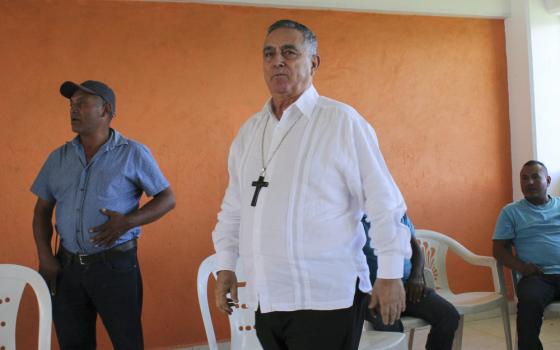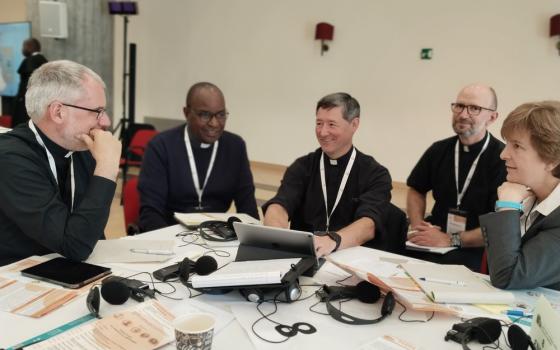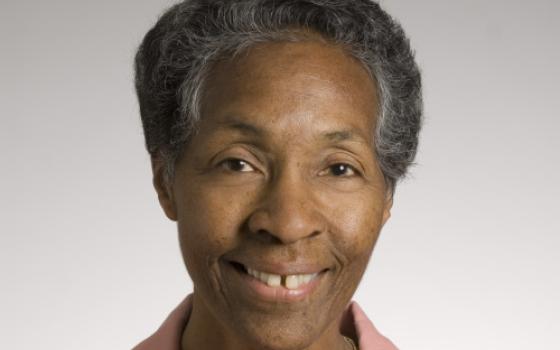Crew members from the NGO rescue ship Ocean Viking give lifejackets to migrants on an overcrowded boat in the Mediterranean Sea Oct. 25, 2022. (CNS photo/Camille Martin Juan/Sos Mediterranee/handout via Reuters)
People often say that in times of crisis, things seem to get worse before they get better. In many cases, this may be true, but what can we do to shift that narrative and start to find a way to make things better before they get worse?
We are currently in the midst of the largest forced migration crisis that many of us have ever seen. There are more than 100 million people around the world who have been forcibly displaced from their homes and this number has made a significant jump in the last 18 months due to the conflict in Ukraine, as well as growing political instability and natural disasters around the world.
Oftentimes, people who are on the move, instead of being embraced as people who need help, are disparaged in the countries to which they flee hoping to restart their lives. While this is true in some parts of our nation, this is not a commentary on the United States, as people in Europe, the Middle East, Africa, and other regions have been known to share the same sentiment towards the newcomer.
No matter where people flee, the rhetoric against the newcomer remains similar: Are they taking our jobs? Are they draining our resources? And on and on. We have heard them before.
As we approach the Catholic community's 109th World Day for Migrants and Refugees on Sept. 24, Pope Francis acknowledges this complex situation saying, "The migratory flows of our times are the expression of a complex and varied phenomenon that, to be properly understood, requires a careful analysis of every aspect of its different stages, from departure to arrival, including the possibility of return."
If we took the time to learn more about the reasons that people are on the move, we would have a better understanding of their needs and the ways we can help. But to understand their needs, their stories must be reported and not treated as unimportant.
Take, for instance, the dueling boat stories in June. One story had five people who went exploring in a submersible to the ocean floor to look at the wreckage of the Titanic. The other story was about a migrant boat trying to cross the Mediterranean, which capsized, killing 82 and up to another 500 who are missing and presumed dead.
The ironic timing of these tragic events, occurring just before the most recent day focusing on refugees, World Refugee Day on June 20, cannot be overstated when you look at the coverage these incidents received. News outlets were devoting hours of coverage to the missing submersible while the migrant boat was barely mentioned. It wasn't until after they had confirmed the implosion of the submersible that stories were written about the disparity in the news coverage.
Both are tragedies and there is no life more valuable than another, but we must treat them that way.
Our Catholic tradition compels us to welcome the stranger and love our neighbors no matter who or where they are. While it is concerning to see the growing number of people who have fled their homes and need assistance, we must respect their right to flee.
The pope's theme for this year's World Day for Migrants and Refugees is "Free to choose whether to migrate or to stay."
Choosing to stay or to flee, is not easy. On one hand, people face harrowing journeys and the potential disaster that happens in the Mediterranean all too frequently as well as rejection, persecution, and poverty in a new destination. Or if they stay, they must endure the crises their families are already facing, including war, violence, climate disasters and other threats. Think of the thousands who stayed in Syria after the years long civil war, who were subject to a catastrophic earthquake earlier this year that killed nearly 60,000 people.
Admittedly, there is no easy way or potentially right or wrong way to fix the current migration crisis. But we need to be able to assist where we can and to help displaced people create as close to a normal life as possible.
For Jesuit Refugee Service, this means providing education and livelihoods trainings to people in 58 countries around the world on six continents. We are there to provide mental health and psychosocial support services for affected populations who have been through horrific events. We are there long after the cameras and the news crews are gone, helping to accompany, serve and advocate for the more than 1.5 million people we served in 2022.
We know that if we make the effort to understand their needs and offer our support, families who have fled their homes can rebuild their lives, contribute to their new communities, and join in creating a hopeful future for all.
Advertisement











